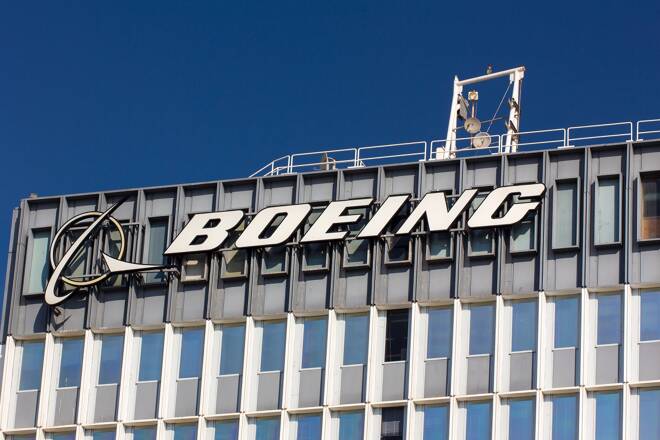Advertisement
Advertisement
Boeing Lowers Aircraft Demand Forecast on COVID-19 Pandemic Crisis, Shares Plunge About 7%
By:
Boeing slashed its rolling 20-year forecast for airplane demand and said that the commercial aviation and services markets will continue to face significant challenges due to the COVID-19 pandemic, while global defense and government services markets remain more stable, sending its shares down about 7% on Tuesday.
Boeing, the world’s largest aerospace company, slashed its rolling 20-year forecast for airplane demand and said that the commercial aviation and services markets will continue to face significant challenges due to the COVID-19 pandemic, while global defense and government services markets remain more stable, sending its shares down about 7% on Tuesday.
The Boeing Market Outlook forecasts a total market value of $8.5 trillion over the next decade including demand for aerospace products and services. The forecast is down from $8.7 trillion a year ago due to the impact of the COVID-19 pandemic.
Airlines globally have begun to recover from a greater than 90% decline in passenger traffic and revenue early this year, but full recovery will take years, according to the outlook.
“Despite lowering numbers, particularly for commercial aircraft, we see further downside risk as the forecast implies peak production levels on average through 2029,” said Kristine Liwag, equity analyst at Morgan Stanley.
Following this release, Boeing’s shares plunged 6.8% to $159.54 on Tuesday, the stock is down over 50% so far this year.
The U.S. planemaker said over the next 20 years, passenger traffic growth is projected to increase by an average of 4% per year and the global commercial fleet is expected to reach 48,400 by 2039, up from 25,900 airplanes today. During this period, Asia will continue to expand its share of the world’s fleet, accounting for nearly 40% of the fleet compared to about 30% today.
The 2020 Boeing Market Outlook includes projected demand for 18,350 commercial airplanes in the next decade – 11% lower than the comparable 2019 forecast – valued at about $2.9 trillion. In the longer term, with key industry drivers expected to remain stable, the commercial fleet is forecasted to return to its growth trend, generating demand for more than 43,000 new airplanes in the 20-year forecast time period, the company said.
The Boeing also projects a $2.6 trillion market opportunity for defense and space during the next decade.
“We derive a price target of $235 based on a blended average of three valuation methodologies based on 3-year average premiums to the market: 1) 14.2X EV/EBITDA on our FY22 EBITDA estimate of $11.0BB derives a price target of $210; 2) P/E multiple of20.8X on our FY22 EPS estimate of $9.30 derives a price target of $193; 3) 5.5% FCF Yield on our 2022 FCF/Share estimate of $16.60 derives a price target of $302,” said Sheila Kahyaoglu, equity analyst at Jefferies.
Boeing stock forecast
Seventeen analysts forecast the average price in 12 months at $189.25 with a high forecast of $260.00 and a low forecast of $147.00. The average price target represents a 18.62% increase from the last price of $159.54. From those 17, eight analysts rated “Buy”, eight rated “Hold” and one rated “Sell”, according to Tipranks.
Morgan Stanley target price is $181 with a high of $238 under a bull scenario and $68 under the worst-case scenario. Boeing had its price target boosted by Credit Suisse Group to $184 from $154. The brokerage currently has a “neutral” rating on the aircraft producer’s stock.
Other equity analysts also recently updated their stock outlook. Edward Jones upgraded Boeing from a “hold” rating to a “buy” rating. UBS Group set a $150 price objective and gave the company a “neutral” rating. Canaccord Genuity restated a “hold” rating and set a $155 price target. Wolfe Research upgraded Boeing from an “underperform” rating to a “peer perform” rating. At last, ValuEngine downgraded Boeing from a “strong-buy” rating to a “buy”.
Analyst view
“We view Boeing as a relative Underweight as we see better opportunities in the aftermarket. We view Boeing’s order book to be more at risk post-COVID than consensus based on our analysis. The main reasons are: 1) A vaccine will not fix airline’s ability to take deliveries overnight; 2) the 737 MAX delay trigger cancellation rights; and 3) the potential for additional 737 MAX delays is still outstanding,” Morgan Stanley’s Liwag added.
“Based on our bottom-up MS Aerospace Retirement Analysis, we estimate there is a $73 billion downside risk to Boeing’s revenue in 2020-2025. If air traffic does not quickly recover back to 2019 levels and airlines don’t regain pre-COVID-19 profitability, there are significant risks of cancellations.”
Upside and Downside risks
Upside: 1) 737 MAX successful re-entry into service converts inventory into cash. 2) Acceleration of aircraft retirements boost new aircraft demand. 3) Profitable customer airlines order new aircraft – highlighted by Morgan Stanley.
Downside: 1) Potential additional 737 MAX delays create additional downside risk to program. 2) Delayed aircraft retirements lower new aircraft demand. 3) Distressed customers’ financials trigger order cancellations.
About the Author
Vivek Kumarauthor
Vivek completed his education from the University of Mumbai in Economics and possesses stronghold in writing on stocks, commodities, foreign exchange, and bonds.
Advertisement
